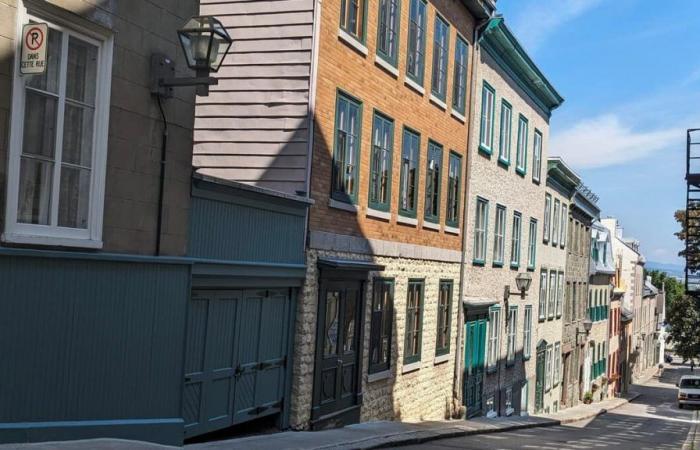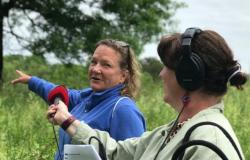A young man from Quebec co-owns three homes until recently rented on Airbnb as primary residences, but neither he nor his partners actually live there.
Gabriel Brunette-Savard and his associates obtained official principal residence establishment registration numbers from the Ministry of Tourism for a house on Île d’Orléans and two apartments in Quebec.
These authorizations issued by the Corporation de l’industrie touristique du Québec (CITQ) allow you to rent your own accommodation short-term on platforms like Airbnb.
But in the case of Brunette-Savard, these are not at all primary residences, he noted. The newspaper.
- Listen to the explanations of journalist Dominique Cambron-Goulet via OLD :
Offering a spectacular view of the St. Lawrence River, a residence in Sainte-Famille, on Île d’Orléans, is registered as the residence of his father-in-law, Mario Bergeron. However, he does not live there regularly, confirms his partner Josie-Anne Savard, met in an accommodation in Quebec.
This house on Île d’Orléans was available for rent on Aribnb before our questions. Photo Jean-Philippe Guilbault, JDQ / Screenshot taken from Airbnb
Gabriel Brunette-Savard’s mother instead confirmed to Journal that she and her husband actually live about thirty kilometers from the house with its bucolic decor.
“We are three owners and one of us has made it his main residence [avec celle de] the island. Everything is in order,” he tried to explain to the Journal the entrepreneur’s mother. She then referred us to her son for any further questions we might have on this subject.
According to Tourist Accommodation Acta principal residence corresponds to the place “where a natural person habitually resides, centralizing his or her family and social activities there”.
His own primary residence is not one
The name of Gabriel Brunette-Savard is the one that appears most often in the list of operators for all of Quebec obtained from the Ministry of Tourism, four times.
He told the ministry that he lives in an apartment on the ground floor of a building in Quebec.
However, his mother and a neighbor confirmed to us that he actually lives above this apartment that he rents on Airbnb. We also met tourists from New York there.
The Ministry of Tourism confirms that it is not permitted to rent adjoining accommodation on a short-term basis, with a main residence license.
Another apartment in a building in Old Quebec is registered as the main residence of Simon-Pierre Côté with Mr. Brunette-Savard as co-operator and co-owner. They rent this condo located on Saint-Flavien Street on Airbnb.
Simon-Pierre Côté rents a condo in Old Quebec on Airbnb that he claims to use as his main residence Photo Jean-Philippe Guilbault, JDQ / Screenshot taken from Airbnb
Mr. Côté does not live there. His father-in-law confirmed to Journal that he resides in a large, newly built house next to his in Saint-Augustin-de-Desmaures.
“Next to [avec] my daughter,” he assured us during a visit to the premises.
The newspaper was also able to consult numerous publications by Mr. Côté’s partner, who is very active on social networks, describing their daily life in Saint-Augustin.
Simon-Pierre Côté did not respond to our multiple interview requests.
In an email exchange, Gabriel Brunette-Savard did not want to grant us an interview about his “principal residence” rentals.
The day after our exchange, his rental listings had been removed from the Airbnb platform.
A fourth apartment, this time in the Saint-Sauveur district of Quebec, is also co-operated by Mr. Brunette-Savard with another business partner, but The newspaper could not confirm whether this was truly his primary residence.
City admits flaws
Even if the municipal administration of Quebec has tried to tighten the screws on accommodation operators on Airbnb, it admits flaws, including the misuse of the notion of main residence.
“We know that where illegality is most often practiced, in terms of tourist accommodation, it is precisely through the notion of principal residence,” reveals Mélissa Coulombe-Leduc, councillor for the Cap-aux-Diamants district and responsible for the file at the executive committee of the City of Quebec.
The newspaper compiled dozens of Airbnb rental listings for non-compliant primary residences in Quebec City alone.
Since April 2024, the City has required a notice of assessment as proof of residence to obtain a collaborative tourist accommodation permit. The City also limits these rentals to 90 nights per year.
The elected official, however, concedes the “complexity” of enforcing such measures.
“It’s difficult for our teams to count these 90 days. It requires a lot of research work to collect information,” explains Mme Coulombe-Leduc.
The municipal administration regularly relies on “citizen help” in these matters.
While not “infallible,” the Quebec City system aims to correct an “inequity” between individuals renting apartments from hotel businesses.
“They pay their taxes on the income they make, they pay the obligatory tourist accommodation tax,” lists the elected official.






